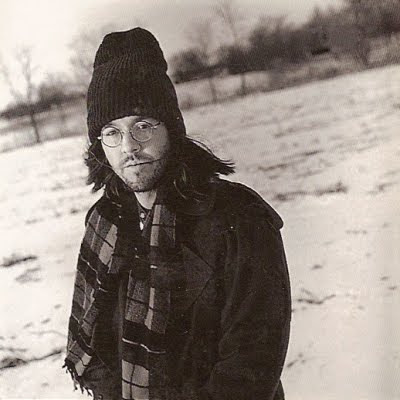A roundtable discussion with three (post-(post-))modern novelists, Jonathan Franzen, David Foster Wallace and Mark Leyner, begins around the thirty-six minute mark.
In a stunning example of "blame the dead guy," the New York Times Magazine ran a riff ("Another Sort of Thing to Pin on David Foster Wallace," Aug. 19, 2011) that admitted that "[DFW] was inarguably one of the most interesting thinkers and distinctive stylists of the generation raised on Jacques Derrida, Strunk and White and Scooby-Doo, and his nonfiction writings, on subjects as diverse as cruises, porn, tennis and eating lobster, are a compelling, often dizzying mix of arguments and asides, of reportage and personal anecdotes, of high diction ('pleonasm'), childlike speech ('plus, worse'), slacker lingo ('totally hosed') and legalese ('what this article hereby terms a ‘Democratic Spirit’ '), often within the course of a single paragraph."
The essay goes on to blame DFW for all that is slack in the world of post-post-modern writers of novels and blogs (imagine! that!). "Wallace isn’t responsible for his imitators, much less for the stylized mess that is Gen-X-and-Y Internet syntax." His followers (Eggers, et al) "borrowed not only Wallace’s tics but also his championing of post-ironic sincerity and his attempts to ward off criticism by embedding all possible criticisms within the writing itself."
That's a post-modern trick, a device, a rhetorical tactic: anticipating the opposing argument and deflating it ahead of time.
"The ur-text of this movement, though, is Wallace’s essay 'E Unibis Pluram: Television and U.S. Fiction,' written in 1993. It’s a call for writing that transcends irony and detachment but, itself, comes drenched in both. The essay bemoans what Wallace saw as the near-impossibility of writing inventive, self-aware fiction in a television culture. He concludes by imagining some future group of 'literary ‘rebels’ ' who would be 'willing to risk the yawn, the rolled eyes, the cool smile, the nudged ribs . . . [and] accusations of sentimentality, melodrama.'"
But hey. That's kind of, er, interesting, um, and I mean that.
Perhaps the most interesting post-suicide DFW essay appeared the the New Yorker ("The Unfinished," March 9, 2009). In the piece, D. T. Max commented on that meta-style most evident in "Infinite Jest," remarking that "such techniques originally had been his way of reclaiming language from banality, while at the same time representing all the caveats, micro-thoughts, meta-moments, and other flickers of his hyperactive mind. Wallace’s approach reminded the reader that what he was reading was invented."
The style may have spawned a million imitators, but after Jest, DFW wanted to move on. Jonathan Franzen, fellow writer and friend, is quoted in the New Yorker piece. “There was a certain kind of effulgent writing that he just wasn’t interested in doing anymore.” In the next novel, the unfinished work published as "The Pale King," a character comments, “Maybe dullness is associated with psychic pain, because something that’s dull or opaque fails to provide enough stimulation to distract people from some other, deeper type of pain that is always there, if only in an ambient low-level way, and which most of us spend nearly all our time and energy trying to distract ourselves from.”

Wallace was trying to write differently, to change his style and, in effect, abandon his imitators, while wrestling with mental illness and a reliance on Nardil, an antidepressant he'd been taking for two decades. He left his life, as well as his next big work, unfinished.
Wallace may have become famous for his freewheeling, self-referential, footnote-laden, post-ironic, slacker-infused extravaganzas, but toward the end he was after a more straightforward, less experimental prose. He wanted to write passionately moral fiction that showed readers how to live a fulfilled, meaningful life. That was a tall order, and he may have fallen short of the mark in his eyes. Couldn't he just write cool stories, that wild, finger-popping, clever work his fans and imitators gobbled like Mint Milanos? Couldn't he play more textual games, meta-fictions, post-ironic ironies with a wink and a nudge and a built-in critique? No, he wasn't playing those games anymore. As he said, “Fiction’s about what it is to be a fucking human being."
No comments:
Post a Comment